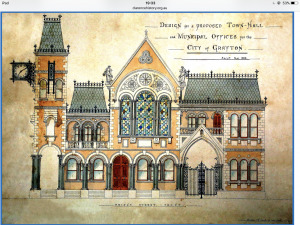Sir Ninian Stephen (1923-2017) was Governor-General of Australia from 1982-1989, and before that, a Judge of the High Court of Australia from 1972-1982. He was named for Nina Beatrice Mylne (1873-1946), an Australian heiress whom his Scottish mother accompanied on her European and Australian travels. Nina Mylne was born at Eatonswill, a property on the Clarence, 8 miles upriver from Grafton, New South Wales. On that property now is a settlement called Eatonsville, on the southbank of the river; the area on the northbank is known as Mylneford.
Nina Mylne’s father, Graham Douglas Mylne (1834-1876), had been born in St Andrews, Scotland, and had been a Lieutenant in the 95th regiment of the British Army from 1853-1861, seeing action on Deesa, India in 1854, the Crimea 1855, Lucknow 1857, Hunker 1858, Burugain, Sandi and Ruiya 1859. He came to NSW in 1859 to take over the property at Eatonswill established in 1839 by his late brothers, John, Thomas and James Mylne. John and Thomas Mylne had returned to Scotland to bring to NSW two Mylne sisters; all four had been among the 121 who did not survive the wreck of The Dunbar at Sydney Heads on the night of 20 August 1857. Only one person survived that disaster. The wreck of the Dunbar was sufficiently searing on the colonial psyche that NSW school children were still taught about it 120 years later. Graham Mylne’s brother James Mylne, who had also served in the Indian Army, had died of natural causes in Malta on return visit to Britain following the tragedy of the Dunbar. According to Louise Tiffany Daley, the Mylne brothers were known for their hospitality and their parties, and for introducing horse racing to the northern rivers.
Graham Mylne married Helena White in 1860. They were good friends with the first Governor of Queensland, the new colony proclaimed on 10 December 1859, George Bowen (1821-1899) and his wife. I wonder if Mylne and the Bowens traveled to NSW from Britain on the same ship. The Bowens’ first surviving child, Adelaide Diamantina Bowen, born in 1858, was known as “Nina”. Bowen appointed his private secretary, Robert Herbert (1831-1905) as the first Premier of Queensland. Herbert organized and won the first elections on 27 March 1860, and served as Premier from 1859-1866. Herbert appointed another of Bowen’s private secretaries, John Bramston (1832-1921), as the Attorney-General of Queensland. The two had met at Balliol College, Oxford, and were life-long friends. They shared a house together on a farm near Brisbane, which they named Herston, combining letters from both their names. Herston is now a Brisbane suburb.
From 1864, Graham Mylne jointly owned a property near Roma in south-western Queensland with Herbert and Bramston, and he was the elected MLA for the surrounding electorate, Warrego, from 1867-1868. The town of Roma, gazetted in 1867, was named for the maiden surname of Governor Bowen’s wife, who hailed from the Ionian Islands. Her father was the President of the Senate (and thus Head of State) of the United States of the Ionian Islands. Graham Mylne’s father-in-law, William Duckett White (1807-1893), built a fine homestead, Lota House, on the sea east of Brisbane, in the suburb now called Lota.
Both Robert Herbert and John Bramston eventually returned to Britain, and Herbert served as Permanent Under-Secretary of State for the Colonies from 1871-1892. Bramston served under his friend as Assistant Under-Secretary of State for the Colonies from 1876-1898. Herbert never married.
Note: The image was The Pioneer by Frederick McCubbin, 1904, now in the National Gallery of Victoria. The city in the background of the third panel is said to be Melbourne.
References:
Louise Tiffany Daley [1966]: Men and a River: Richmond River District 1828-1895. Australia: Angus and Robertson.
